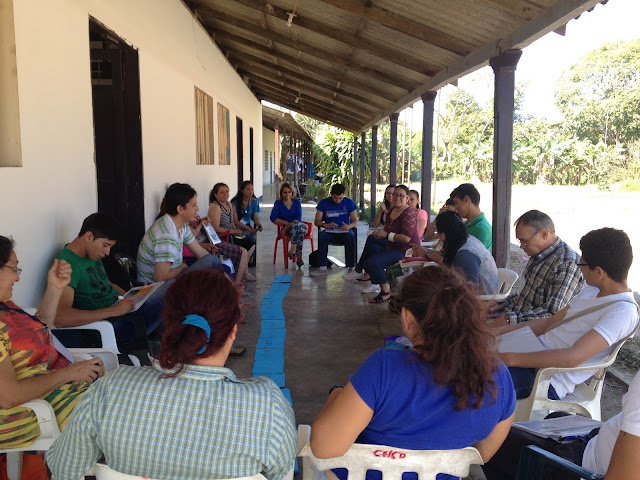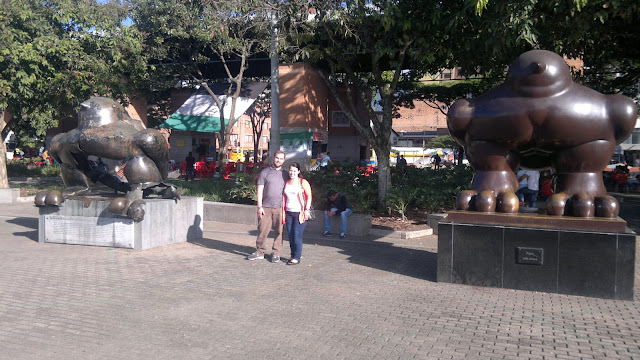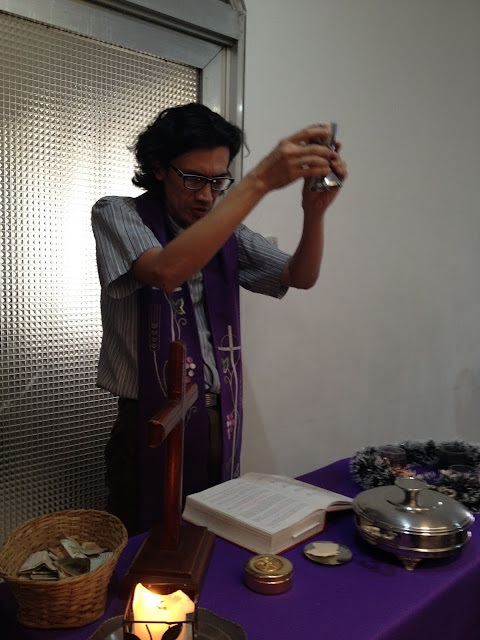“My life Flows on in endless song; above earth's
lamentations. I catch the sweet, though far-off hymn, that hails a
new creation.
No storm can shake my inmost calm, while
to that Rock I'm clinging.
Since Christ is Lord of heaven and earth, how
can I keep from singing?
Through all the tumult and the strife, I hear that
music ringing. It finds an echo in my soul. How can I keep from singing?
[refrain]
What though my joys and comforts die? The Lord my Savior liveth. What though the
darkness gather round? Songs in the night he giveth. [refrain]
The peace of Christ makes fresh my heart, a fountain ever
springing! All things are mine since I am his! How can I keep from singing?
[refrain]
Refrain: No storm can shake my inmost
calm, while to that Rock I'm clinging. Since Christ is Lord of heaven
and earth, how can I keep from singing?” ELW
Hymn #763
Since 10th grade this song has become one of my rocks. When I was
in 10th grade, a young man in my congregation was diagnosed with a
very aggressive brain
cancer. Although the chemo and surgeries bought him a number of months, the
cancer was still there. Just after the doctor left, telling him finally there
was nothing more they could do, John sang this song in the solitary quiet of
his room. The doctor, having stopped just outside John’s door to collect
himself, heard John’s strong and beautiful song. John’s profoundly deep faith
was a testament to everyone who knew him. He died a few months later, at the way too young age of 21.
 |
Me with The Twins: Jenny (left with blue glasses),
me in the middle, and
Cate (right with the pink glasses).
(Photo credit: selfie, Jenny) |
In March, I was again reminded of this song and John’s life. I
was on a very full bus back to Bogota from the youth retreat, sitting with 'The
Twins', Jenny and Cate (Zulma's daughters). Unknown to us their cousin was in
Bogota having a stroke, leaving her half paralyzed. This was the beginning of
the journey we now know to be a very aggressive brain cancer.
Laurita, 10 years old, has been a trooper. Since March, she has
had 3 brain surgeries and started chemo. She quickly lost her hair, but not her
spirit. When she started losing her hair, her mom (Lizeth) held her breath,
wondering how Laurita was going to react. True to her nature, she looked in the
mirror and said: "oohhh, I look sexy". Another story I heard a few
weeks ago took place the last day of school last year. During a break/quiet time Laurita wasn't
tired, so while the other children were resting she took and put a rock in
every student's backpack. You get a sense of Laurita's nature: a joker,
prankster, and all-around good-natured kid.
 |
Zulma, this was on a recent travel. We took a walk and found
this old can had been turned into a chair. (Photo credit: me) |
This is a family I have become
very close to. I credit Zulma with
teaching me Spanish, giving me work, making me feel like I have a purpose here, and befriending me. She is who I work alongside every day, who I travel with and the one I go to when I need help, and so much more to me.
So, why am I writing? I am writing to you, our readers, supporters, family, friends, and whoever else sees this, to ask for prayer. There is nothing else I (or you) can do. Two weeks ago when Laurita went in for her chemo her little
body was too weak to handle the treatment. They gave her a little more time to
see if her body would get stronger. It didn't. She will start radiation this
week with hopes of a better outcome. This has (of course) affected the whole
family. After Laurita's stroke in March, when she was unable to walk up and
down stairs, her whole family moved in with Zulma's family where there
is an elevator. The Twins have taken on an extra role in helping care for Laurita and Juan David, including taking their whole summer break to care for the two rather than hang out with friends. The Twins are in school studying to be nurses, and Lizeth is also a nurse, so Laurita is constantly surrounded by good care.
Saint Paul wrote that
when one member of the body of Christ suffers, we all suffer; and when one
member of the body of Christ rejoices, we all rejoice (I Corinthians 12:26). Please keep the family in your prayers: Laurita, her brother -
Juan David (6), her mother - Lizeth, her Aunt Zulma, and The Twins (20): Cate and
Jenny. Prayer for healing in the fullest sense, peace, strength, and wisdom for Laurita and her family and friends, that we might not lose hope in God who walks with us.
 |
Laurita and her family after church this last Sunday:
Juan David (6) left, Lizeth/Mom center and Laurita (10) right.
(Photo credit: me) |
Therefore, since we are justified by
faith, we have peace with God through our Lord Jesus Christ, through whom we have obtained access to this
grace in which we stand; and we boast in our hope of sharing the glory of God. And not only that, but we also boast in our
sufferings, knowing that suffering produces endurance, and endurance produces character, and character
produces hope, and hope does not disappoint us, because God’s love has been poured into our hearts through
the Holy Spirit that has been given to us. (Romans 5:1-5)





















































